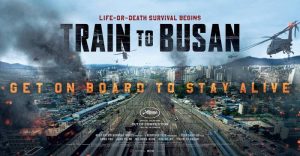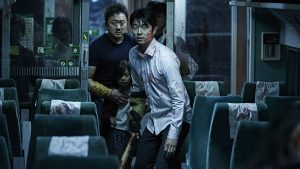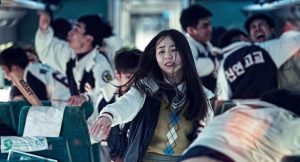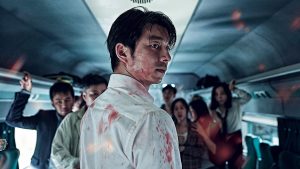
If you were to take the amount of zombie films created since the dawn of cinema and combine them, you’d have a film that would last a lifetime. My hyperbolic statement is meant to draw attention to the fact that zombie films aren’t far and few between. Seemingly every week a new one is being released, either on the big screen, on home video, or behind the alley on the way home. In order to stand out from the pack, each film needs a unique spin: fast-moving zombies, zombie romance, zombies in space, etc. Without a gimmick, the film will get lost in the shuffle. Unless you’re “Train to Busan,” that is.
“Train to Busan” doesn’t offer much new in the way of zombie mayhem, but is so refined in its approach that it doesn’t matter. It borrows the virus outbreak angle from hits such as “28 Days Later” & “World War Z,” utilizing the fast-moving zombies made famous by them and the “Dawn of the Dead” remake. Using the outbreak as political commentary is nothing new, nor are the recycled caricatures posing as characters. Even its unique angle, the zombies not being able to see in the dark, isn’t wholly original. It is reminiscent of the blind zombies in “High School of the Dead,” where sounds and movements are detected. All of these elements should hinder the production, but instead elevate it thanks to kinetic pacing, strong atmosphere, terrific scope, thrilling disaster elements, and a big heart.

Admittedly, the story as a whole is rather derivative. Workaholic father stereotype Seok Woo (Gong Yoo) agrees to take his neglected daughter stereotype, Soo-an (Kim Soo-an), on a train to Busan to see her mother in spite of a heavy workload. Wouldn’t you know it, they choose the one train with a zombie aboard, while thousands plague the city (labeled rioters by the media). What ensues is a race to Busan, conveniently labeled a safe haven, amidst zombie attacks and political infighting. Heroically macho stereotype Sang Hwa (Ma Dong-seok) clashes with Seok, labeling him a coward who leeches off of others simply due to his position as a funds manager (considering the company he works for and his initial narcissism, he’s not far off). His sweet pregnant wife stereotype, Sung Gyeong (Jung Yu-mi), keeps the two at bay until their teamwork blossoms naturally. Other stereotypes include a truly selfish businessman, a caring conductor, an aloof attendant, a kindly old woman and her bickering friend, and vain teenagers who rise to the occasion during a crisis.
The kinetic pacing is enough to overshadow the shortcomings of Yeon Sang-Ho’s script, even if his direction isn’t aware of the issues. The film moves so fast that there’s not enough time for the ham-fisted drama to derail it. Just as soon as the citizens board the train, the infected passenger transforms into a vicious zombie. Half of the train is infected within minutes, ratcheting up the tension via claustrophobia. Our protagonists struggle to keep the zombies at bay, relying on teamwork and one teenager’s sick baseball skills to thwart their infected foes. The zombies are a relentless bunch, hurling themselves through windows and leaping from the sky. One doesn’t have time to catch their breath before another zombie makes its presence felt.

Sang-Ho keeps up the pace by differentiating the tension. The initial outbreak relies on pure hysteria; the blunt commentary causing friction between the characters. The second act has them briefly depart the train, only to find a station overrun with infected soldiers and officers. Their only choice is to board their train once again and hightail it to Busan. Of course, zombies still find their way on board, with the claustrophobia being put to full effect. Zipping through tunnels introduces the blind zombie angle, producing one clever scenario in which the heroes use a tacky cell phone ringtone as a decoy for their escape. The finale plays up the disaster movie elements heavily, including one magnificent stunt that rivals top blockbusters.
The film occasionally slows down to focus on the drama; a noble effort, but one that is mired by hokeyness. The characters are presented as nothing more than caricatures, resulting in drama that feels manufactured and trite. Their conflicts follow suit, with the political commentary so blunt it loses all impact. There’s a revelation at one point that is so obvious it holds no weight. These moments slow down the film as opposed to enhancing it, calling attention to the derivative nature on display.

That is until the second act. About midway through the film, the forced drama began to win me over. It wasn’t the result of the direction, but of the determined performances. All of the actors instill enough charisma and subtle nuances into their roles to make them endearing. The father/daughter angle, which was so trite at the start, became heartwarming and enthralling by the end. Sang Hwa’s macho attitude was off-putting at first, but he develops a good rapport with Seok Woo that I wound up rooting for him. Even the oft-forgettable side characters get their moments to shine. By the time the admittedly ballsy finish comes into effect, I found myself engrossed by the sentimentality as opposed to turned off by it. The film earns its sentimentality.
“Train to Busan” may not reinvent the zombie genre, but it does a damn fine job of reinforcing it! The action is exhilarating, the tension is palpable, the atmosphere is phenomenal, and the scope is grand. Scripting issues pose a serious problem in spots, but are quickly glossed over and eventually ironed out. The film is so much of an adrenaline rush that I found myself forgiving its clichés and contrivances and accepting its heart. I was having too much fun to care about the shortcomings, something I can’t say about most zombie movies!
Final Rating: B+
